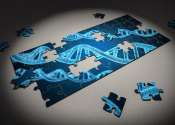Spotlight on Space Station science
hough all ESA astronauts are back on Earth, European science on the International Space Station is ongoing. Explore a few experiments underway right now in celebration of science at ESA.

hough all ESA astronauts are back on Earth, European science on the International Space Station is ongoing. Explore a few experiments underway right now in celebration of science at ESA.
Space Exploration
Feb 4, 2019
0
8

A team of researchers from the University of Bordeaux and CNRS, EPOC, UMR has found evidence that suggests oysters sync their valve behavior with the lunar cycle. In their paper published in the journal Biology Letters, the ...

Cells replicate by dividing, but scientists still don't know exactly how they decide when to split. Deciding the right time and the right size to divide is critical for cells – if something goes wrong it can have a big ...
Cell & Microbiology
Nov 16, 2018
0
74

A novel mathematical approach has uncovered that some animal cells have robust 12-hour cycles of genetic activity, in addition to circadian or 24-hour cycles. The method, published in the journal PLOS ONE, assessed the periodicity ...
Molecular & Computational biology
Sep 20, 2018
0
44

It turns out timing really is everything, at least when it comes to the diets of lab mice that have their circadian clocks disrupted. A new study published in Cell Metabolism is reporting that limiting the times when the ...
Cell & Microbiology
Aug 30, 2018
0
116

Every day you get a day older. So do plants. While the biological daily clock ticks, time passes also for the aging clock. Scientists at the Center for Plant Aging Research, within the Institute for Basic Science (IBS), have ...
Plants & Animals
Aug 9, 2018
0
50

A new study by an international team of scientists, including the University of Bristol, has discovered that plants adjust their daily circadian rhythm to the cycle of day and night by measuring the amount of sugars in their ...
Plants & Animals
Aug 2, 2018
0
505

Several months ago, professors Jeffrey Hall, Michael Rosbash and Michael Young received the Nobel Prize for their work on deciphering the mechanisms of the biological clock. Many other scientists around the world are also ...
Cell & Microbiology
May 30, 2018
0
15

A team of researchers at Lund University has found evidence that suggests a certain protein plays a prominent role in bird navigation. They have published their findings in Journal of the Royal Society Interface.

It may be time to tailor students' class schedules to their natural biological rhythms, according to a new study from UC Berkeley and Northeastern Illinois University.
Social Sciences
Mar 29, 2018
6
4169